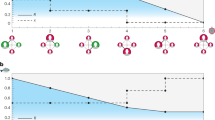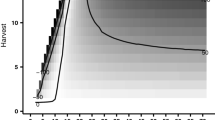Abstract
Natural resources are vulnerable to over-exploitation in the absence of effective management. However, norms, enforced by social ostracism, can promote cooperation and increase stock biomass in common-pool resource systems. Unfortunately, the long-term sustainable use of a resource is not assured even if cooperation, maintained by ostracism and aimed at optimizing resource use, exists. Here, using the example of fisheries, we show that for a cooperative to be maintained by ostracism over time, it often must act inefficiently, choosing a ‘second-best’ strategy where the resource is over-harvested to some degree. Those cooperatives that aim for maximum sustainable profit, the “first-best” harvest strategy, are more vulnerable to invasion by independent harvesters, leading to larger declines in the fish population. In contrast, second-best strategies emphasize the resistance to invasion by independent harvesters over maximizing yield or profit. Ultimately, this leads to greater long-run payoffs to the resource users as well as higher resource stock levels. This highlights the value of pragmatism in the design of cooperative institutions for managing natural resources.




Similar content being viewed by others
References
Andrew NL, Béné C, Hall SJ, Allison EH, Heck S, Ratner BD (2007) Diagnosis and management of small-scale fisheries in developing countries. Fish Fisheries 8:227–240
Arrow K, Bolin B, Costanza R, Dasgupta P, Folke C, Holling CS, Jansson BO, Levin S, Mäler KG, Perrings C, Pimentel D (1995) Economic growth, carrying capacity, and the environment. Science 268:520–521
Axelrod R, Hamilton WD (1981) The evolution of cooperation. Science 211(4489):1390–1396
Costello C, Ovando D, Hilborn R, Gaines SD, Deschenes O, Lester SE (2012) Status and solutions for the world’s unassessed fisheries. Science 338(6106):517–520
Darwin C (1860) On the origin of species by means of natural selection, or the preservation of favoured races in the struggle for life. John Murray, London
Gordon HS (1954) The economic theory of a common-property resource: the fishery. J Polit Econ 62(2):124–142
Hardin G (1968) The tragedy of the commons. Science 162:1243–1248
Hilborn R (2012) The evolution of quantitative marine fisheries management 1985-2010. Nat Resour Model 25(1):122–144. doi:10.1111/j.1939-7445.2011.00100.x
Hilborn R, Walters CJ (1992) Quantitative fisheries stock assessment: choice, dynamics and uncertainty. Springer, US
Lade SJ, Tavoni A, Levin SA, Schlüter M (2013) Regime shifts in a social-ecological system. Technical report, Grantham Research Institute on Climate Change and the Environment
Leslie HM, Basurto X, Nenadovic M, Sievanen L, Cavanaugh KC, Cota-Nieto JJ, Erisman BE, Finkbeiner E, Hinojosa-Arango G, Moreno-Báez M, Nagavarapu S, Reddy SMW, Sánchez-Rodríguez A, Siegel K, Ulibarria-Valenzuela JJ, Weaver AH, Aburto-Oropeza O (2015) Operationalizing the social-ecological systems framework to assess sustainability. Proc Natl Acad Sci 112(19):5979–5984
Levin SA, Lubchenco J (2008) Resilience, robustness, and marine ecosystem-based management. BioScience 58(1):27– 32
Mangel M, Dowling N, Arriaza JL (2015) The Behavioral Ecology of Fishing Vessels: Achieving Conservation Objectives Through Understanding the Behavior of Fishing Vessels. Environ Resour Econ 61(1):71–85. doi:10.1007/s10640-013-9739-7
Nowak MA (2006) Five rules for the evolution of cooperation. Science 314(5805):1560–1563
Ostrom E (1990) Governing the commons: the evolution of institutions for collective action. Cambridge University Press
Ostrom E (2007) A diagnostic approach for going beyond panaceas. Proc Natl Acad Sci 104(39):15181–15187
Ostrom E (2009) A general framework for analyzing sustainability of social-ecological systems. Science (New York, N.Y.) 325(5939):419–22
Ostrom E, Gardner R, Walker J (1994) Rules, games, and common-pool resources. University of Michigan Press
Pomeroy RS (1991) Small-scale fisheries management and development: towards a community-based approach. Mar Policy 15:39–48
Schlüter M, Tavoni A, Levin S (2014) Robustness of norm-driven cooperation in the commons to environmental variability. Technical report, Grantham Research Institute on Climate Change and the Environment
Sethi R, Somanathan E (1996) The evolution of social norms in common property resource use. Am Econ Rev 86(4):766–788
Tarui N, Polasky S (2005) Environmental regulation with technology adoption, learning and strategic behavior. J Environ Econ Manag 50(3):447–467
Tavoni A, Schlüter M, Levin S (2012) The survival of the conformist: social pressure and renewable resource management. J Theor Biol 299:152–161
Acknowledgments
We thank Matthew Burgess, Alessandro Tavoni, Maja Schlüter, and an anonymous reviewer for helpful comments. The National Science Foundation provided financial support for this work through Dimensions of Biodiversity grant OCE-1046001 and grants GEO-1211972 and EF-1137894. Additional funding was provided by the Nordforsk-funded project Green Growth Based on Marine Resources: Ecological and Socio-Economic Constraints (GreenMAR) and by the Army Research Office Grant W911NF-14-1-0431.
Author information
Authors and Affiliations
Corresponding author
Appendix: Parameters
Appendix: Parameters
Parameter | Description |
|---|---|
R | Fish stock biomass |
f c | Fraction of cooperators |
r | Intrinsic growth rate of fish population |
k | Carrying capacity of fish |
q | Catchability of fish |
n | Number of fishers |
e i | Effort of strategy i |
π i | Profit of strategy i |
U i | Utility of strategy i |
p | Unit price of fish |
w | Unit cost of effort |
ω(f c ) | Ostracism function |
h | Maximum value of ostracism function |
d L | Relative effort of independent harvesters |
c L | Relative effort level of cooperators |
S R | Slope of resource nullcline |
\(S_{f_{c}}\) | Slope of strategy nullcline |
γ | Cost to ostracize an individual |
Rights and permissions
About this article
Cite this article
Tilman, A.R., Watson, J.R. & Levin, S. Maintaining cooperation in social-ecological systems:. Theor Ecol 10, 155–165 (2017). https://doi.org/10.1007/s12080-016-0318-8
Received:
Accepted:
Published:
Issue Date:
DOI: https://doi.org/10.1007/s12080-016-0318-8




